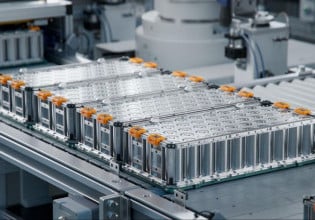BritishVolt Rescued by Australian Start-up
Hot on the heels of its bankruptcy announcement, the U.K. battery startup has been purchased by an Australian battery maker.
Just weeks after collapsing into bankruptcy, startup lithium-ion battery maker BritishVolt has found a savior in the Australian firm Recharge Industries, which has purchased the British company out of receivership (the U.K. equivalent of bankruptcy).

Artist rendering of BritishVolt. Image used courtesy of BritishVolt
BritishVolt was founded in December 2019 and received funding from mining giant Glencore and others, with promises from the UK government for a £100 million grant if the company met certain milestones. With only specialist auto manufacturers Aston Martin and Lotus as potential clients and a failure to reach its plant construction and battery technology goals by early 2023, the funding ran out, and BritishVolt declared the U.K. equivalent of bankruptcy.
BritishVolt had intended to make cylindrical-cell batteries specifically for the electric vehicle (EV) market. The annual production capacity by 2025 was predicted to be more than 38 gigawatt-hours (GWh). The battery gigafactory it was building in the Northeast of England was expected to cost $4.7 billion and would eventually employ 3,000 workers.
The collapse of BritishVolt left just one battery manufacturer in the U.K. China-based Envision AESC operates a 1.9 GWh battery plant in Sunderland, making batteries for Nissan Leaf vehicles that are built in England. Envision has begun construction of a new gigafactory at Sunderland that will have an additional capacity of 12 GWh when it opens at the end of 2025.
The BritishVolt site in Blyth, Northumberland was said to be attractive to other battery manufacturers, as it has good access to rail infrastructure and a nearby deep-water port and is well-placed for renewable energy resources. Tata Group of India, owners of both Jaguar and Land Rover, were said to be looking at locations in Europe to build its gigafactory, and the Northumberland site was probably on its list of potential locations.
Recharge to the Rescue
The Australian company Recharge Industries, which is owned by a private New York-based investment fund called Scale Facilitation, was started in 2021 and announced plans to begin producing its own battery gigafactory in August 2022. The price paid for the acquisition has yet to be disclosed, but the new owners have indicated they plan to keep the BritishVolt name but take the business in a different direction. They plan to focus on producing batteries for energy storage with the hope of having these storage cells in production by the end of 2025. The Australian battery startup company currently has plans to produce 270 amp-hour (Ah) prismatic cells suitable for various applications, including energy storage and mobility, from its yet-to-be-built Australian gigafactory. The company says it would eventually like to produce EV batteries in limited quantities for high-performance electric sports cars at the Northumberland facility, presumably using the same prismatic battery architecture. High-volume production of battery cells for more ordinary production cars is many years down the road.

Artist rendering of Recharge Industries’ battery gigafactory. Image used courtesy of Recharge
No White Knight For British EVs
The failure of BritishVolt in its initial go was seen as a failure of the British auto industry to keep up with the inevitable electrification of transportation. Before the failure of BritishVolt, the U.K. would have accounted for just 0.6 percent of global battery production in 2031—without BritishVolt that number is about 0.3 percent.
While the battery energy storage market is of great importance to maintaining a power grid made up of renewable energy, the revised version of the plans for BritishVolt don’t appear as though they will help the British auto industry, already beleaguered by tariffs and export duties brought about the Brexit. As we noted in the earlier announcement of the bankruptcy of BritishVolt, it is difficult to see how any British automaker will be able to compete as electric vehicles become mainstream by 2030 and beyond.






